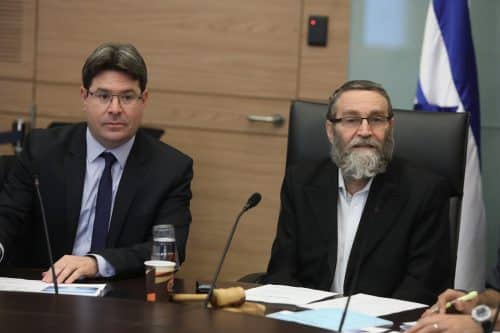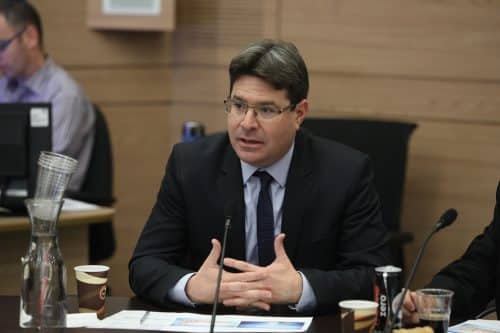Chairman of the Finance Committee Gafni: "The budget for 2019 will not allow the ministry to meet the goals of strengthening Israel's position as a sought-after technological power" * Minister of Science Akunis: "The ministry is relatively small in its budgets, but very large in its importance to the country. We must not lose our comparative advantage in favor of other countries"

"In order to preserve Israel's position as a technology powerhouse and as a country sought after by many countries in the world, the state's investments must be increased, among other things, by increasing the budget of the Ministry of Science and Technology and the budget intended for the promotion of Israeli communication satellites." This is what the Chairman of the Finance Committee, MK Moshe Gafni (Torah Judaism), said on Monday, during a discussion on the budget of the Ministry of Science.
Science Minister Ofir Akunis (Likud) noted that "more and more countries, many of them from the developed countries, are following Israel and looking to strengthen ties with it in the fields of science and innovation." Aconis added that "although since the beginning of the last decade, the budgets of the Ministry of Science have increased significantly, but these are still insufficient budgets that do not allow the implementation of very important programs to strengthen Israeli science and innovation, including in the field of space. Today's discussion was the third discussion on the government ministries' budget, as part of the Finance Committee's discussion framework for the approval of the 2019 budget.
MK Gafni opened the debate by saying that he "doesn't remember a budget like the one of 2019, which is without decrees and the Law of Arrangements that is attached to it, is the Law of Arrangements that has no dramas and does not contain very significant matters. Gafni, who in the previous term was the chairman of the Knesset's science and technology committee, said that he sees great importance in holding the debate on the budget of the Ministry of Science and considers it important to strengthen the budget of the ministry's responsibilities.
Minister Akunis said in the discussion that "The Ministry of Science and Technology is one of the most important ministries in the State of Israel, it deals with very large investments in the export of technology and innovation. In all Western countries and other countries, there is a tremendous desire to strengthen international ties with the State of Israel, from India and China to the countries of North and South America, countries in Africa and other countries. We have turned from a nation that exports oranges to a nation that exports brains, in high-tech and other scientific fields. A medium-small office in terms of its budget scope, but a large office in terms of its importance to the country. Our goal is not only to preserve Israel's position as a powerhouse of science and innovation, but to strengthen it."
Akunis presented an overview of his ministry's budget: "The budget has grown relatively much. If at the beginning of the current decade, there was still talk of embarrassing budgets of 146 million NIS in 2010 and 197 million NIS in 2011, then the 2019 budget will be 515 million NIS. This is the budget after it was cut due to horizontal cuts and an update of currency rates, when from the beginning it was supposed to be 559 million NIS. He expressed displeasure about how he learned about the cut: "A week after the budget was approved by the government, the Treasury informed the director general of the ministry, that due to the currency exchange rate update and flat cut, the budget will be cut. This is not a form, I am a minister in the government that approved the budget, it is not possible for things to be done in this way."
According to the minister The main objectives of the office are: "Making science and technology accessible to all citizens of Israel, wherever they are. Also in the ultra-orthodox and Arab sectors. Among other things, the ministry promotes programs to make science accessible, including in the peripheral settlements and weak neighborhoods. For example: Tens of thousands of families across the country participate in the 'Scientists' Night' project, which we promote, a project in collaboration with 15 academic institutions that exposes entire families to contemporary fields of scientific knowledge and innovation. So is the 'Lehva' project for digital literacy, which is promoted in 30 municipalities. "Unfortunately, the project is stuck due to personnel issues that we have with the Treasury Department at the Treasury."

The Director General of the Ministry of Science Peretz Vazan said that "all responsibility for the Lahava project has been transferred to the Ministry of Science, but we are subject to the instructions of the Accountant General at the Treasury. We are at a dead end and cannot recruit instructors, so we are having trouble implementing this important program. The very fact that the Treasury decides how many instructors to recruit and where to place them, this is unacceptable." The representative of R&D and higher education in the Accountant General's Division of the Ministry of Finance, Daniel Pereg, responded: "We are in talks with the Ministry of Science in order not to interrupt the activity and are aware of the importance of the activity in the periphery, so we found an outline of a gradual transition from the existing tender to a new tender. The tender was defined to expand the activity. There is opposition from the attorney's office to the continued employment of external instructors as computer specialists. There is a large volume of claims from the instructors who want to be civil servants. It is under legal discussion at the moment, as long as instructors continue to be employed in the existing tender, this may increase the problem. The attorney's office ordered to reduce the employment of instructors in the current tender."
The Minister of Science presented other projects to make science accessible: "Subsidized summer camps; 80 NIS per child per week. Excellent programs, including girls from the ultra-Orthodox sector and girls from the Arab sector, the Israeli space week which is run in 15 municipalities and so far 65 thousand participants have taken part, science and enrichment classes in 59 municipalities, the science basket revolution: in 178 municipalities; Robotics, cyber, exact sciences groups and more. In addition, projects to encourage future scientists, mentoring for science studies. Above all, the office is working to strengthen and expand international ties, we have signed cooperation agreements with many countries from Asia, Europe, North and South America and also in Africa."
A subject where progress is required that is not being made in practice is the subject of space, especially when it comes to communication satellites. The chairman of the science committee MK Uri Makalev (Torah Judaism) who participated in the discussion said: "We are losing the advantage we have in space. We have no ability to cope, we have lost the technological advantage in the field in favor of other countries, for example, India. The Amos 6 satellite that exploded on the launch pad led to the fact that this field is actually being closed and foreign companies are providing communications satellite service to the State of Israel. You have to think about what will happen in an emergency situation where a foreign company, even if it is from a friendly country, is the one providing the service, will it continue to provide it even then." Ministry CEO Vezan: "After the loss of Amos 6 in an explosion, there was talk of the production of a new communication satellite and it was even defined as an issue of national importance, but not budgeted for accordingly. In the discussions with the Treasury, we did not reach the closing of the budget gap on the issue."
R&D and higher education representative in the budget department at the Ministry of Finance, Michal Galbert: "In the 2019 budget, there is an additional budget of NIS 14 million and rising, and in total we will reach an amount of NIS 82 million, which is a significant increase in the space budget." MK Moshe Gafni intervened in the matter and said: "The state has failed on the issue of space and is bringing such a budget that the issue will disappear. We highly praise the work of the Minister of Science and his office. The fields of science and technology, beyond the economic contribution, have political and security importance."
In conclusion, Gafni demanded that the finance representatives "return to the committee with an answer within three weeks, which would be a week before the approval of the budget, with answers regarding the continuation of the Lahava project and whether they intend to give an additional budget for the promotion of the communication satellite project. As a committee, we do not accept the statements that issues are stuck because of one or another legal advisor, nor do we accept the fact that the budget of the Ministry of Science was cut without any discussion as to whether it can meet its tasks with the given budget. I demand to receive the answers three weeks from today, then we will be required to decide as a committee, whether we approve the budget as it is."

One response
Rebbe Melo